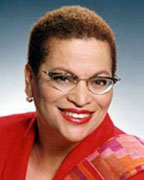
Stimulating students during summer
By Julianne Malveaux NNPA Columnist
It’s mid-July. Do you know if your children are learning? Just a month ago they were eager to leave the regimentation of the daily classroom to “enjoy the summer.” A month from now, many will prepare to return to school. Will they return ready to hit the ground running in the fall? Or, will they struggle to catch up because their summer activities were not stimulating enough to prevent learning losses.
Student’s score lower on standardized tests at the end of the summer than at the beginning of the summer, according to the National Summer Learning Association. That organization makes a strong case that young people must be engaged in summer learning and enrichment opportunities, because they lose as much as two months of math learning, and more than two months of reading proficiency without summer engagement. Of course, lower income students experience more losses, while middle-class students may gain proficiency during the summer.
The National Summer Learning Association says that at least half of the achievement gap between lower and higher income young people is a function of unequal access to summer learning opportunities. Some youngsters don’t have summer opportunities because they don’t know about them, others because they can’t afford them, and still others because they are needed at home. Some teens are tasked with taking care of younger siblings, though they might be better served in enrichment programs that would prepare them for the next school year. Others must choose between work and summer enrichment programs, and when money matters, work wins over enrichment. And while subsidized summer enrichment programs are available, some students are unable to participate when even modest fees are required.
I’ve not spoken of race, only income, in examining the importance of summer enrichment programs. But because African American students are more likely to be low-income than others, we know that race matters here. We also know that space makes a difference as well. There will be a greater variety of summer enrichment programs in affluent neighborhoods, as opposed to other neighborhoods. And while programs in affluent neighborhoods may offer scholarships for those who need assistance, transportation may become a barrier. Whether excuses or explanations, the achievement gap speaks to differential outcomes.
While summer enrichment opportunities are differentially available, with Black and Brown young people less likely to have access to opportunities than others, some organizations are doing the work to ensure that young people are intellectually engaged during the summer, enabling them to return to school ready to do their best work.
Marian Wright Edelman, founder and leading light of the Children’s Defense Fund, has developed a Freedom School program that teaches young people civil rights history along with basic skills. Organizations can purchase the curriculum and send staff for training in teaching it. Thousands of young people are being positively impacted by Freedom Schools.
Lots of local programs have developed programs that have elements similar to those at the CDF Freedom Schools. A week or so ago, I began my morning with the young people at Washington D.C.’s Southeast Tennis and Learning Center for their “Read Aloud” program. At about 8:30 in the morning, the youngsters, whose ages range from 6 to 15, gather in a circle to hear a book read to them, and to engage in an energetic and affirming ritual. I love the read aloud program because I love looking into the eyes of these young people, to imagine the leaders they will become.
I read Faith Ringgold’s Aunt Harriett’s Underground Railroad in the Sky as selected students acted out the words, joined me in song, and applauded each other as the story came to an end. Flashback to preadolescence – the students who played the parts of Cassie and Bebe, a sister and brother separated moving along the railroad were supposed to hug when reunited. While the young man was “up” for the hug, the young woman looked like she wanted to run in another direction.
The Read Aloud program ends with a rousing group rendition of Labi Siffre’s “Something Inside,” complete with choreographed hand gestures and motions. Every morning, these 50 or so young’uns are affirming themselves through song. The adults who participate in the Read Aloud program are politicians and business leaders, artists and educators. If they are anything like me, they leave uplifted by the children and their promise of resilience.
I’m encouraging those who can to help with a summer enrichment program. Spend a day, a few afternoons, and maybe more time to help provide a summer experience. Funding helps provide great summer opportunities for our youth, and informal programs with a couple of retired teachers and a church basement can go a long way, as well. We cannot afford is to widen the achievement gap by leaving too many of our young people unengaged this summer.


Be the first to comment